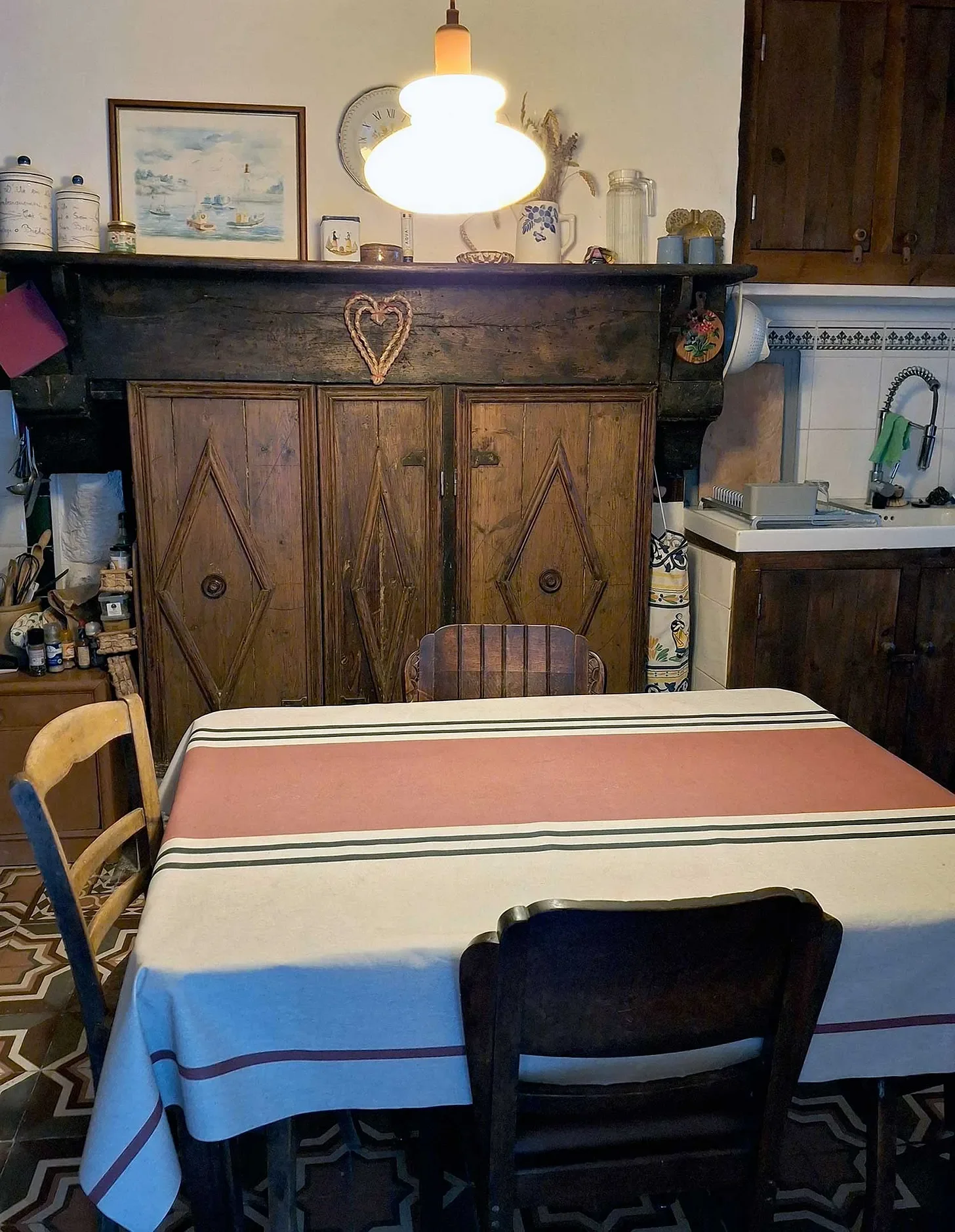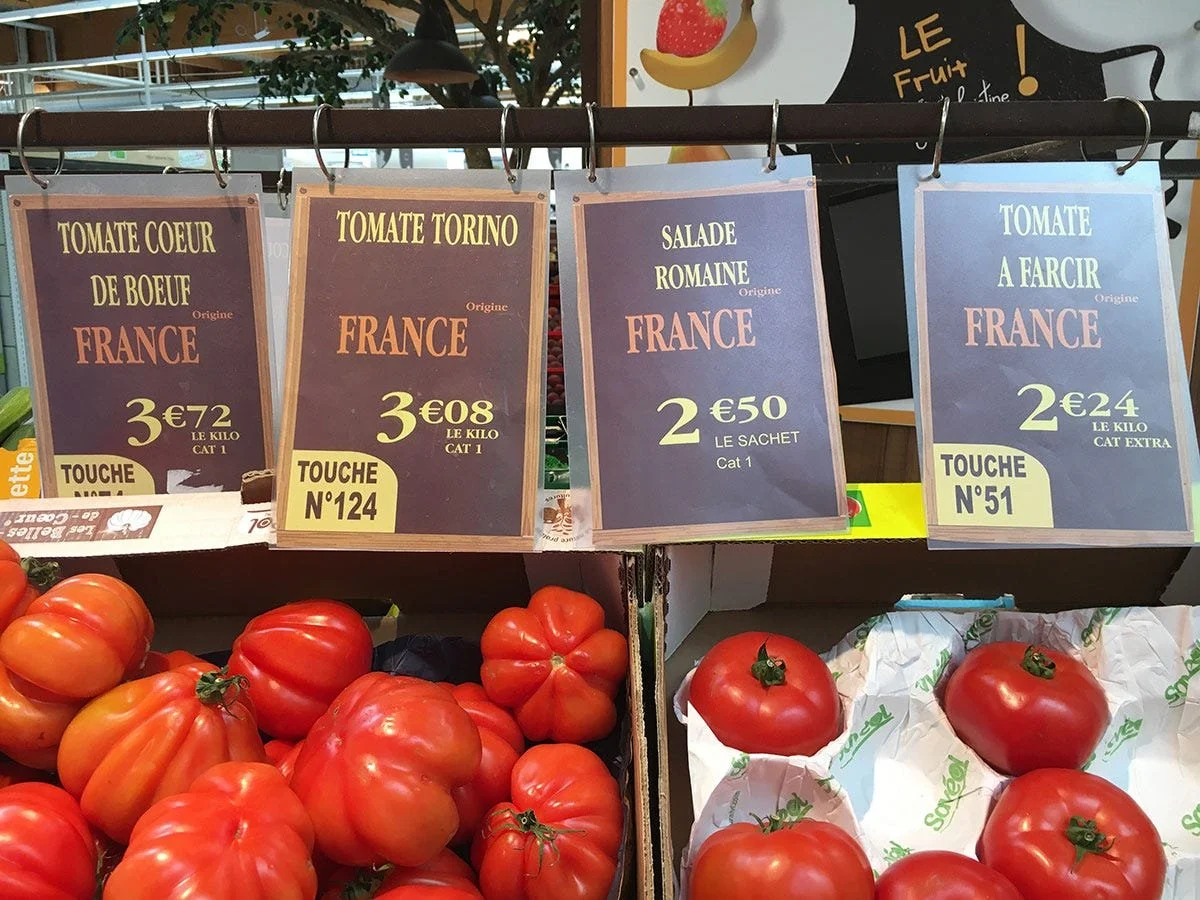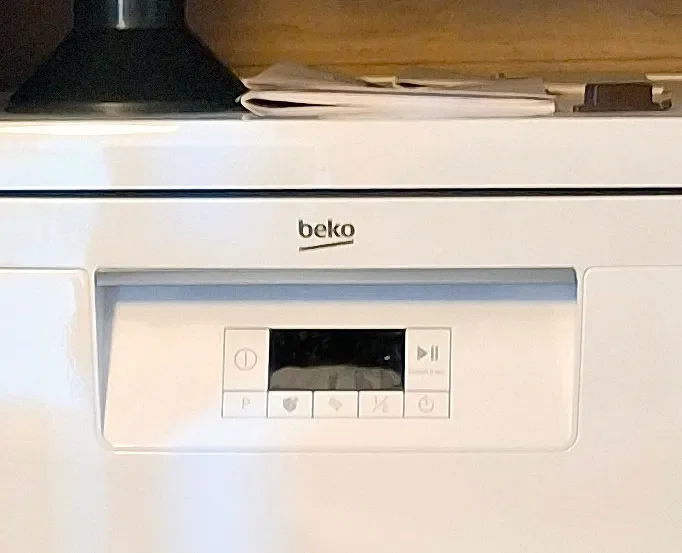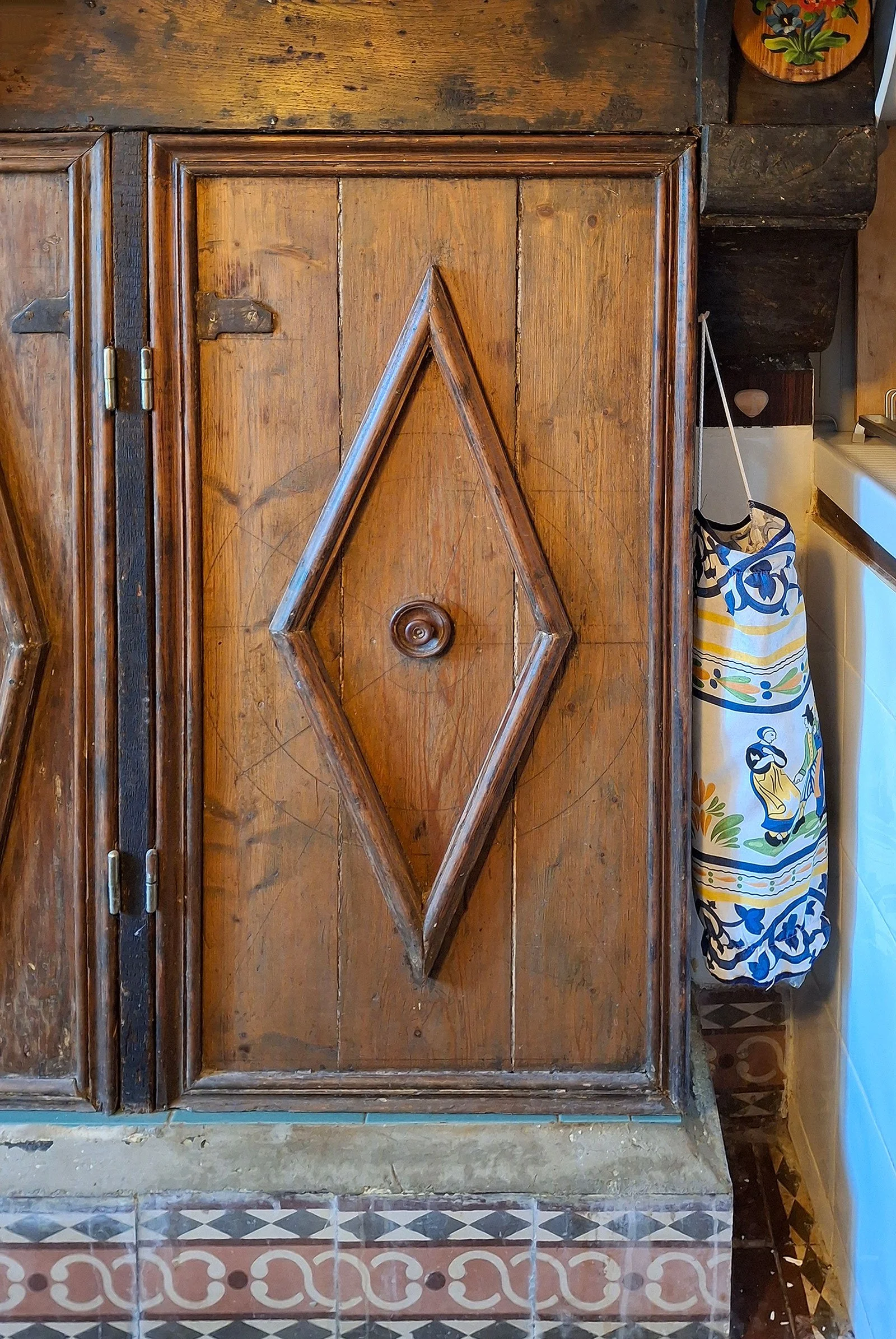September 2025 Newsletter
ANNOUNCEMENT: I'm now on Substack. Click here to visit.
Volume 9, Number 8, September 2025
Dear Friend,
I told you I’d tell you about my dishwasher….
The first week Donna and I were at the house in Plobien last summer (2024) the dishwasher went kaput. Actually, it was already kaput when we got there, but we didn’t know it. I ran a cycle, as usual, adding the requisite amounts of salt (to soften the water), soap (to do what it does), and rinçage (to eliminate streaking). I pushed the button to set the eco temperature—doing my teeny bit to save the planet—and turned the knob, letting the machine run while we enjoyed watching John Travolta punch Dennis Farina in the nose for the thousandth time in Get Shorty when the house went dark—very dark, as the electricity for the entire house shut off….
We’re in rural France. These things happen. I flipped the power switch on, and the house lit up. We finished watching the movie, and that was that. Then, a few days later, Donna turned on the dishwasher, and two thirds of the way through the dry cycle the house went dark.
It was late August. We were in Plobien until late October—more than enough time to get the dishwasher repaired. In the U.S., I’d call Mr. Kim, our ever-ready, always-has-the-right-tools-and-parts-to-fix-any-brand-of-any appliance, repair person. In France, I call Rick and Ella, then Madame P, Bruno and Françoise, and Gilles and Tatjana, all of whom have dishwashers, none of whom knows an artisan who will come to the house to fix the machine. I call Sharon, who doesn’t have a dishwasher, but has more contacts than Heidi Fleiss, and she doesn’t know anyone either, so I go online and type electromanager reparations/machine à vaiselle and find six listings within thirty kilometers, eighteen miles, of Plobien. I write to each of them, telling them the brand, “C’est un Bosch” and model number, adding, “la machine est àgée, plus vingt ans. C’est marche bien, nettoye tout, mais avant fini le cycle coupe l’éctricité dans la maison. Tout la maison.” It’s a Bosch. The machine is old, more than twenty years old. It works well, cleans everything, but before it finishes, the cycle cuts off the electricity in the house. The whole house.
No one responds. I wait a few days and try calling. I reach two people and explain the situation. They both say Plobien is too far away, out of their work zone, and they can’t/won’t come to the house to see what’s wrong, but if I bring the machine to their shop, they will look at it.
Stymied, I wait a few more days, then Donna and I drive twenty-five kilometers to DARTY, where I bought the Bosch and explain it all again to a middle-aged woman who keeps looking over her shoulder for relief or reinforcements as I speak. When I finish, she says, “C’est le panneau.” It’s the panel—the part with the electronics and all the controls.
As soon as I hear this I think goodbye repair, hello replacement, though hopefully only the panel and not the machine. “C’est possible le nouveau panneau,” I ask?
She shrugs then looks online, and says, “Non.”
I’m of the age now when every diagnosis demands a second opinion…. We drive back to Loscoat and go to GITEM, where I buy all my small appliances, like electric toothbrush, Waterpik, and phone.
“Bonjour,” I say to the happy-you’re-here, happy-to-serve-you, almost, but not-quite, smiling-fortyish-something youngish man behind the counter. I tell him the same story, and he concludes the same answer. “Le panneau ne fonctionne pas.”
“C’est possible le nouveau?” I ask?
He goes online, looks up the machine, model, and part, and says, “Oui.”
Ha! I knew it. How much, I ask—“Combien?”—feeling victorious, a feeling I have less and less the older I get.
“Trois cent cinquante euros, deux cent cinquante pour le pièce et cent pour le travail.” Three-hundred-and-fifty euros, two-hundred-and-fifty for the part and one hundred for the work. He points to a machine near the front door and says, “Cinq cent cinquante euros,” five-hundred-and-fifty euros, letting me know spending three-hundred-and-fifty euros to fix a twenty plus-year-old machine without a warranty when I could buy a new machine with a warranty for two hundred euros more is nuts.
The machine he’s pointing at is 60 centimeters, 23.6 inches wide, the size of a normal U.S. machine. The machine I have and want is 45 centimeters, 17.7 inches wide. It sits in a special cabinet Martin built years ago in what once was a huge, walk-in cooking fireplace, and now is a multipurpose kitchen cabinet. I’m thinking three quarters the size, three quarters the price—around 400 euros—which makes spending three hundred and fifty euros to fix the old machine even nuttier.
“Monsieur, avez-vous le petit machine en la magazine?” Do you have the little machine in the magazine?” I know the word I want is magasin, store, but I pronounce it magazine, like a storage area for ammunition and/or explosives, or Time.
“Non.”
“Combien jours?” How many days?
“Une ou deux semaines.” One or two weeks, which I know probably means longer.
“Combien pour la livraison et commence le nouveau machine et prende le ancient?” How much for delivery and start the new machine and take the old?
“Trente-neuf euros.” Thirty-nine euros.
“Et combien pour le petit nouveau machine?” And how much for the new little machine?
“Cinq cent cinquante euros.” Five-hundred-and-fifty euros, the same as the large machine. It doesn’t seem fair, but five-hundred-and-eighty-nine euros for everything, the new machine, delivery, set up, and removal of the old is in my ballpark.
“Merci beaucoup,” I thank him, point to my head, and say, “Je pense,” I think.
A few days later Donna and I drive back to DARTY, where I know there’s a large selection of machines on the floor, and sure enough I see a 45 cm Bosch for seven hundred euros. It’s more than I want to spend—one hundred and eleven euros more than the machine at GITEM—but it’s here, available now, and I want this over and done and to stop living in fear of losing electricity (and the best sentence I ever wrote), or worse, burning the house down from an electrical short, not to mention washing the dishes by hand.
Delivery, set up, and removal were free when I bought the old machine. I’m counting on it being the same or a nominal increase. I find the lady from last time—who’s still looking for relief and reinforcements, and say, “Bonjour, Madame, combien pour la livraison et commence le nouveau machine et prende le ancient?”
“Cent trente-neuf euros.” One-hundred-and-thirty-nine euros.
Holy Merde! Now, instead of being finished, as I hoped, I have to make a decision: eight-hundred-and-thirty-nine-euros or five-hundred-and-thirty-nine, now or weeks from now, the happy to see me almost smiling guy or the reinforcement-seeking woman….
It’s September—three weeks after the first blackout, and I’m back at GITEM to look at the 60 cm version of the 45 cm dishwasher. I walk in, see the happy-to-see-you Monsieur behind the counter, and say, “Bonjour, Monsieur. Je voudrais regarder the cinq cent cinquante euros lave-vaisselle.” I would like to watch the five-hundred-and-fifty-euro dishwasher.
He comes around the counter, actually smiling, and walks past an Electrolux, Whirlpool, Bosch, Siemens, Phillips, Miele, Thompson, and stops in front of a Beko. It reminds me of Bilko, Sargeant Bilko, the conniver, and being bilked, though as far as I know, I’ve never been bilked in France, though I also know, there’s always a first time….
“Chinese,” I ask?
“Turque.”
He opens the Beko’s door and says, “Inox-tout.” He’s showing me the machine is all stainless steel, not plastic. “Fort.” Strong, sturdy. He points to two buttons, one for on/off/pause, the other to set the program 1,2,3,4 then points to the other machines, all of which have dials and multiple buttons and touch screens, and I see he’s already figured out simple—simplest—is best for me and for him, as the fewer problems I have, the fewer he’ll have. But a Beko? Really?
“Je pense,” I say, and go home to look up Beko online. It is Turkish, which is not German, but not Chinese either. I read reviews and see Beko is a major European producer of dishwashers. I compare the model Monsieur has with the seven-hundred-euro Bosch, and see they’re comparable, except, I remember, the machine I have and the Bosch at DARTY both have a salt indicator to tell me when to add salt to the machine to soften the water, and I don’t recall seeing an indicator on the Beko.
I go back to the store, open the door, and the happier-to-see-me, happier-to-serve Monsieur rushes to shake my hand and greet me, sure, I’m sure, of the sale.
“Bonjour,” I say. “J’ai une question. Le Beko a la piece pour le sel pour regarder combien le sel est necessaire?” The Beko has the part for the salt to watch how much salt is needed?
“Oui,” he shows me where it is, then says in English, “No salt is necessary. The water in Loscoat and Plobien doesn’t need it.” I’m happy to hear this even though I’ve unnecessarily been buying salt for the last thirty years and just bought a new five-pound box the day before the electricity cut the second time.
“Merci,” I say, shake his hand and go back to the house to think about a Beko. A Beko or a Bosch?
Over the next few days, I go online and compare the Beko with Whirlpool, Brandt, Bosch, Phillips, and Electrolux and see they are comparable in everything except price. I’m thinking you get what you pay for, unless, of course, you pay too much…. I have an Electrolux clothes dryer. It works well—even though I can’t work it—so I go back to GITEM to look at the 60 cm Electrolux dishwasher. I scurry into the store, hoping Monsieur doesn’t see me, open the Electrolux’s door, and look inside: it’s flimsy, not inox, and the utensil container is small, easily breakable, crap.
“Bonjour,” Monsieur says, and I jump, as if I was caught doing something I shouldn’t, which, I guess, in a way, I was: doubting him.
“Pas inox,” I say, pointing inside. “Très petit et fragile,” I say, holding up the utensil container.
“Oui,” he says, and walks me back to the Beko. The utensil container is large, strong, and sturdy—inox—but this is the 60 cm machine, so I ask:
“Monsieur, cette piece,” holding up the utensil holder, “la même material en le petit machine?” This piece the same material in the small machine?
“Yesss,” he says in English, not quite as happy to be working with me as before, trying not to show it, and failing.
“Bon.” I’m about to buy it when I remember my machine sits on the far-right side (as you face it) of the kitchen fireplace-cabinet, and the plug is on the far-left side. The cord runs from the right corner of the Bosch along the floor of the cabinet, halfway up the left wall to the only plug, which means the cord has to be long, but how long?
I go back to the house and measure it: 183 cm, six feet.
I wait a few days to give Monsieur a break from me, as his almost smile becomes less so each time he sees me. I sneak into the store, hiding behind the refrigerators and go the long way around to the Beko. I look behind the machine and see the cord is neatly wrapped at the bottom of the machine, making it impossible to measure. Now, I have to see him.
He’s at the counter looking at something behind him. “Bonjour,” I say, and he turns around with a big smile that disappears as soon as he sees me. In the U.S., the guy would be happy to see me—or at least pretend to be—thinking he was that much closer to the sale. Here, I can see the importance of the sale is diminishing in proportion to the amount of time he spends with me. What he doesn’t know is I’ve bought enough wrong items in France—like the wrong mattress cover three times—to know anything can, and for me too often does, go wrong, and it’s better for both of us if I check everything out and don’t have to return the dishwasher, in the highly unlikely event that I can.
“Monsieur,” I say, “la machine à lave-vaisselle reste en la droit en la cabinet et le pris en le gauche. C’est necessaire le corde cent quatre-vingt-trois centimetres.” The dishwasher stays on the right in the cabinet and the socket on the left. It is necessary the cord one hundred and eighty-three centimeters.
He looks at me like he can’t believe this, and it’s not because cabinet doesn’t mean cabinet, but office. Slower than before, he walks me to the Beko—the full size, 60 cm, heavy, bulky machine and tips it forward, leaning it against his hip, balancing it, and nods, like, ‘See, there’s the cord.’
I see it, but I can’t measure it because it’s wound at the bottom of the machine, so I ask, “C’est cent quatre-vingt-trois centimetres?”
He nods.
“C’est possible, je fait le measurement?”
He glares.
“Avez-vous le metre?”
He drops the machine back with a thud, which makes me glad this isn’t the one I’m buying, and goes to the counter, gets his measuring tape, and hands it to me, working hard not to make eye contact. He tips the machine back and leans it against his hip while I squeeze behind it, unwrap the wire, and measure it.
“Cent quatre-vingt-trois centimetres,” I say. “C’est la même pour tout les machines?” Is it the same for all machines?
“Oui,” he groans, reverting to French. If he could, I’m pretty sure he’d drop the machine on my head.
“Merci,” I say.
I still haven’t fully decided between the Beko or the Bosch, 539 euros or 839, getting what I pay for, or paying too much. On one of our earlier visits Donna told him I bought a house in Plobien and wrote a book about it. I’m going back and forth, forth and back, Beko or Bosch, when he blurts, “How many times did you go to your house before you bought it?”
“Two,” I said, realizing this was nuts. I’ve been to the store four times—five if you count the original repair question—for a five-hundred-and-fifty-euro machine and twice for my house.
“OK,” I say. “The Beko—et la livraison?”
He gives me a date three days after our return flight. I call Bruno and Françoise, my friends and next-door neighbors, and ask if they’ll be in Plobien the day of the delivery. They won’t, but they’ll drive ninety minutes to meet and greet the delivery guys and watch them remove the old Bosch, set up the new Beko, run it through a complete cycle, and hope it works, doesn’t leak, isn’t loud, and doesn’t cut the electricity off, because if it does I (1) didn’t need the Beko, (2) should have kept the Bosch, and (3) now need an electrician.
On the appointed day, the delivery guys arrive on time. Françoise and Bruno meet them. The Bosch is removed. The Beko set-up. The delivery guys leave. Bruno and Françoise run it through the full cycle. It doesn’t leak, isn’t loud, and doesn’t cut the electricity. There’s only one problem, Bruno writes to me in California: the cabinet door doesn’t close: the water feed and discharge hoses are too short—The one thing I didn’t ask about—and the machine can’t be pushed to the rear of the cabinet.
All fall, winter, and spring I worry and wonder if a longer hose or extension exists, and if Rick or Monsieur C, my plumber friend and savoir, can fix it. It’s either that or living with the open kitchen cabinet door, which will make me crazy, but when Donna and I return in 2025 I see the cabinet door is fully closed, and that Rick has worked his magic again…. And so it goes, as Kurt Vonnegut liked to say, and for me in Plobien, in France, it goes very, very well. Mercy beaucoup.
News about I Am Finally, Finally French,
My Accidental Life in Brittany
October 28, BOOK LAUNCH at Mrs. Dalloway’s Bookstore in Berkeley. Marion Abbott—writer, editor, Francophile, and co-founder and previous co-owner of Mrs. Dalloway’s—and I will have a conversation about the book and life in France. Lots of people will be there to hear and see Marion. To get information and a seat, click here.
November 12, Alliance Françaises U.S.A will broadcast an online conversation about the book with Janet Hulstrand—author of Demystifying the French and A Long Way from Iowa, From the Heartland to the Heart of France—and me. The broadcast is open to everyone. Select ‘guest of the presenter’ when you register and you’ll get in for free, click here.
November 20, France Today magazine will broadcast an online conversation with Janet and me. The broadcast is open to France Today subscribers BUT the editors have agreed to offer you, my newsletter readers, a 30-day free subscription membership which will allow you to see the event for free. Click here and scroll down for a description of the event.
December 6, Alliance Française, Napa will sponsor a book event at Bookmine bookstore in Napa, CA. The event is free and open to everyone. I’ll give you the link in the next newsletter.
December 13, AT Frenchie (@atfrenchies) will host an online book club discussion with Gigi Kuhn—Senior Educator of French language and culture. Normally, these events are only for paid students, BUT they will extend a Zoom invitation to readers of the newsletter to attend the discussion for free. I’ll post the invite in the next newsletter.
The October newsletter will have new reviews of the book and an interview with Janet Hulstrand for France Today. Meanwhile, don’t forget the contest: If you buy the book, review it on Amazon and/or Goodreads, and send me the review—good, bad or indifferent—by December 6, your name will be placed in a hat and you will be eligible for one of four prizes: First prize, a freebie month at the house in Plobien; second prize, three week’s stay; third prize, two week’s stay, and fourth prize, one week. All at a time of your choosing—assuming someone else isn’t already there. Send your review to me at mark@markgreenside.com.
If you have a blog or newsletter, holiday mailing list, book club, or email list of friends, family, neighbors, or colleagues, please consider forwarding this newsletter to them or telling them about the book, and remember: if they read the book and review it, they, like you, are eligible to win the contest. NOTE: the December newsletter will be the last newsletter sent with Mailchimp. Starting January 2026, the newsletter will be sent by Substack only (saving me $500/year). If you’re not already, please be sure to sign up on Substack so you can continue to receive the newsletter.
Bonne chance, and thank you for your continued interest and support. You have no idea how much it means to me. Mercy beaucoup.
Bonne chance, and thank you for your continued interest and support. You have no idea how much it means to me. Mercy beaucoup. More content, including previous newsletters, are available:
Email: mark@markgreenside.com
Substack: mgreenside.substack.com
Web site: www.markgreenside.com
Facebook author page: facebook.com/markgreensideauthor
Amazon author page: amazon.com/author/markgreenside
I Am Finally, Finally French, will be released
in one month on October 28, 2025. It's available at any brick-and-mortar bookstore for pre-order, or click on one of the retailers below.
Copyright © 2025 Mark Greenside
Illustrations by Kim Thoman
















